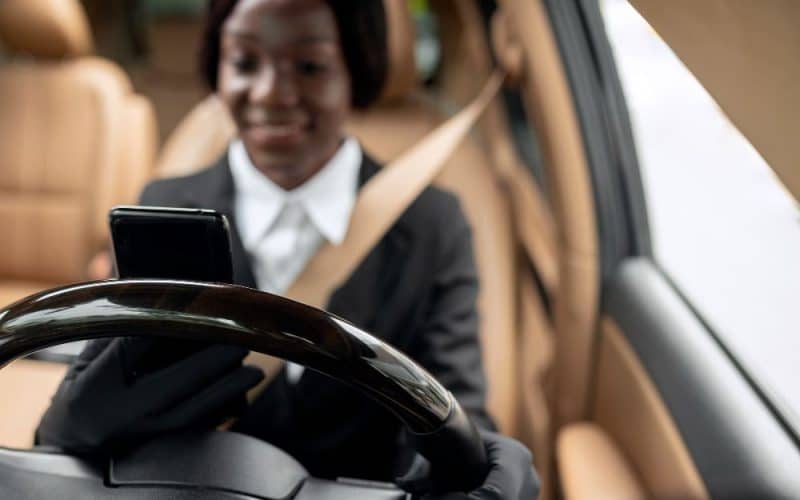If you are an Uber driver, you get 24/7 driver support and insurance coverage. Personal insurance for Uber and Lyft drivers — on top of those companies’ coverage — is the best way to be fully covered on the job. Often called rideshare insurance, these hybrid policies include coverage for personal auto use.
They also cover the times when drivers are signed in to a ridesharing app but are not covered by Lyft’s or Uber’s insurance. Drivers for on-demand delivery companies like Grubhub, Instacart, and Uber Eats also need rideshare insurance to avoid a coverage gap.
What is insurance for Uber drivers?
Car insurance is legally required in most states and is an important financial tool that could help protect you from paying in full for expensive damage if you cause an accident. However, your personal car insurance policy does not cover transporting people from place to place in exchange for money and an accident that occurs while you are driving for business purposes may not be covered.
Drivers who decide to pick up work through ridesharing services like Uber and Lyft may believe they are protected by the limited commercial car insurance policy extended by the rideshare company. Still, these policies usually leave some key coverage gaps and typically offer low coverage amounts that may not be sufficient if you get into an accident.
Also known as rideshare insurance, insurance for Uber drivers extends coverage beyond what those limited plans offer. It fills in the gaps and provides additional protection in case of an accident while driving for a ridesharing service.
While rideshare insurance is not legally required in most states, it could save drivers a significant amount of money if they get into an accident while acting as a rideshare driver. If you have an existing car insurance policy, you can often get an endorsement for rideshare insurance that extends your personal insurance coverage to also cover you while you are driving for a ridesharing app.
This includes whether you have a passenger in your car, are driving to pick up a passenger, or if you have the app on and are waiting for a potential customer.
Insurance for Uber drivers stages
To understand the insurance for rideshare driving, it’s important to know the three phases while a rideshare app is on:
- Available: The driver is available to pick up a passenger.
- En route: The driver has accepted a ride and is on the way to pick up the passenger.
- On the trip: The driver has picked up the passenger and is on the way to the passenger’s destination.
When an Uber — or other rideshare app is off — your personal auto insurance applies. Once your rideshare app is on, Uber provides some coverage. Knowing the gaps between that coverage is key to making sure you are properly protected.
Here’s a breakdown of the three driving periods and what Uber covers:
| App is on; waiting for ride request | Third-party liability coverage if your personal auto insurance doesn’t apply • $50,000 in bodily injury coverage per person • $100,000 in bodily injury coverage per accident • $25,000 in property damage coverage per accident |
| App is on; heading to pick up passenger | • $1 million third-party liability coverage • Uninsured/underinsured motorist bodily injury coverage • Contingent comprehensive and collision coverage up to actual cash value of car with $1,000 deductible |
| App is on; passenger picked up; driver traveling to passenger’s destination | • $1 million liability coverage • Uninsured/underinsured motorist bodily injury coverage • Contingent comprehensive and collision coverage; up to actual cash value of car with $1,000 deductible |
Break down of coverage terms
Here are definitions related to insurance for uber drivers:
Third-party liability coverage
This pays for bodily injury and property damage caused to a third party from a car accident. A third party is someone or something other than the driver or their vehicle. For example, if a rideshare driver rear-ends another car, auto liability insurance pays the other driver.
Uninsured/underinsured motorist bodily injury coverage
This coverage pays for injuries suffered by a rideshare driver and their riders if a car accident happens during a rideshare trip and another driver is at fault who doesn’t have sufficient insurance. This coverage also might apply in the case of a hit-and-run accident.
The coverage limits provided by the rideshare insurance company will vary by state.
Contingent collision and comprehensive coverage
If you carry comprehensive and collision coverage on a personal auto insurance policy, the rideshare company provides collision and comprehensive coverage during the time you’re going to pick up a rider or have a rider. A deductible (which can be substantial) reduces a claim payment for these coverages.
If you don’t carry collision and comprehensive coverage on your vehicle, Uber won’t provide it either.
Minding the Gap
An Uber driver might be happy with the insurance provided by the rideshare company, especially if the driver carries only the minimum personal auto insurance required by the state. In those cases, a million dollars in liability coverage from Uber can look like a major bonus.
But there can still be gaps, which is where rideshare insurance comes in.
For example, rideshare companies don’t typically provide collision or comprehensive insurance when the app is on and you’re waiting for a ride request. And a personal auto policy that includes collision and comprehensive likely won’t cover that period. So if you accidentally back into a pole, you’d have no insurance for the damage.
In some states, a rideshare driver might be able to buy a rideshare endorsement, or add-on, for a personal auto insurance policy. This endorsement can help fill gaps between the rideshare company’s coverage and a driver’s personal coverage. For instance, an Uber endorsement may pay the $500 difference between the company’s $1,000 deductible for collision coverage and a $500 deductible for the driver’s own collision coverage.
Insurance companies that offer insurance for Uber drivers
Here are insurance companies that offer rideshare insurance coverage, the policy types and what’s covered by each policy.
Mercury
Mercury is the best rideshare insurance company for Uber drivers because the policy specifically covers you when driving any number of passengers. You get the same coverage while transporting one passenger as you do through Uber Pool, where you might be driving multiple people.
Another good thing about Mercury’s rideshare insurance is that it’s pretty affordable. You can get coverage for as little as $0.90 per day, which equates to less than $30 per month. To get a free quote and purchase a policy, you can contact a Mercury agent. You’ll also be able to set your deductible and choose your coverage limits.
Filing a rideshare insurance claim through Mercury is simple, and you can do it by phone, mobile app, or the company’s website. Once you file a claim, you can track the status of the claim through your customer account.
One of the major downsides of Mercury is that rideshare insurance is not available everywhere. In fact, the coverage area is very small. Currently, Mercury rideshare insurance is sold in Arizona, California, Florida, Georgia, Illinois, Nevada, Oklahoma, Texas, and Virginia.
USAA
USAA is one of the best insurance companies for Uber drivers because it’s widely recognized as one of the top insurance providers on the market. USAA’s rideshare coverage is reliable, customizable, and affordable.
USAA’s rideshare insurance can be used for any type of ridesharing or delivery driving. You can get a free quote by logging into your USAA online account and seeing how much coverage costs in your area. USAA doesn’t advertise any discounts or add-ons for its rideshare insurance offering.
If you need to file a claim, you can start the process online, through the mobile app, or by calling an agent, who will connect you with a claim adjuster. USAA partners with a network of 2,900 repair shops, but you have the option to take your car to any shop of your choosing if it needs repairs after a covered claim.
The biggest downside to USAA is that the eligibility requirements are strict. You can only purchase rideshare insurance if you are an active duty or retired military servicemember or the spouse or child of a servicemember. Additionally, USAA rideshare insurance is only available in 42 states, including Washington, D.C.
Farmers
If you want an insurance company with excellent claim handling, you should choose Farmers. The company is rated above-average for overall claim satisfaction in J.D. Power’s 2020 U.S. Auto Claim Satisfaction Study.6 Plus, you can file a claim online, through the mobile app, or by calling an agent, and track the status of existing claims from your phone or computer.
Farmers rideshare insurance is available to most drivers in the gig economy, whether you work for Uber, Lyft, Amazon Flex, Grubhub, DoorDash, or another delivery service. To get the rideshare endorsement, you must already have a personal car insurance policy through Farmers.
Although Farmers’ commitment to fast and fair claim handling is remarkable, there are a few downsides to this provider. First, you need to contact an agent to get a quote or purchase a policy. There’s also no information online about what coverage limits or deductibles are available.
Another thing to know is that Farmers has a relatively small coverage area. The endorsement is available to drivers in 36 states. However, the coverage area has slowly expanded over the last several years.
Progressive
Progressive has a lot of coverage options. Any endorsements you’ve added to your personal policy, such as roadside assistance or rental car reimbursement, apply when you drive for a TNC like Uber or Lyft. Plus, you get full coverage during trips.
You must have an existing auto insurance policy from Progressive in order to add the rideshare endorsement. To get a free quote, you’ll need to contact an agent or fill out a form online. An agent can also explain what coverage limits are available and what deductibles you can choose from.
Although Progressive doesn’t have online quotes for rideshare insurance, you can file a claim online if you get into an accident. Customers also have the option to file a new claim through the mobile app or by calling an agent.
Why do Uber drivers need insurance?
Most major insurers do not allow you to use your personal car insurance for business purposes. You need rideshare insurance in any situation where you drive your car to earn money, whether you drive for ridesharing companies like Uber or Lyft or an app-based delivery service.
Your personal auto insurer is unlikely to cover accidents that happen during your Uber gig, and it could cancel your policy if it finds out you haven’t disclosed you drive the car for money. Even if you have coverage from the company you rideshare for, it likely won’t apply the entire time you’re on the job.
Though Uber will provide coverage while you are driving with a passenger, you won’t be covered when you are in between rides. A standard personal insurance policy won’t cover you, either. You’ll need to add rideshare coverage to your personal policy through your insurer. Without the added coverage, you’ll have gaps in your auto insurance.
Rideshare insurance isn’t available everywhere. If you can’t get it, you’ll need a commercial insurance policy to be fully insured and avoid being dropped by your carrier.
Recommended Articles
- RV INSURANCE: What Is It & What It Covers?
- Insurance Lapse: Definition, How It Works & Grace Period
- Accidental Death Insurance: Meaning, Coverage & Benefits
- At-Fault Accident: Everything You Need To Know
- Term and Whole Life Insurance: What’s The Difference?
- Life Insurance Loans: Understanding How It Works





